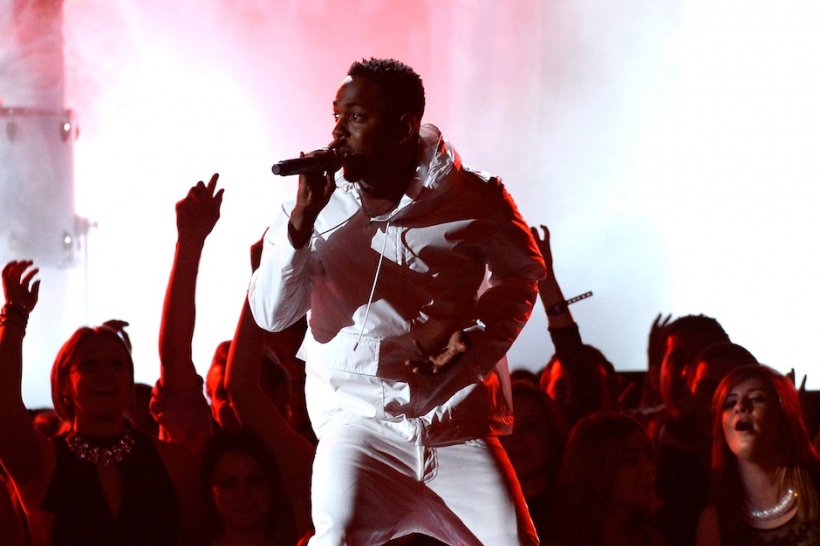The Grammys’ continued ghettoizing of the rap awards to the pre-telecast was actually welcome this year: It meant not having to hear Macklemore’s name called over and over again and hearing that opportunistic, conscious-rap cornball “aww shucks” his way through a whole bunch of speeches. Macklemore and Ryan Lewis pretty much swept the rap awards, receiving Best Rap Performance and Best Rap Song (for “Thrift Shop”), Best Rap Album (for The Heist), and, during the primetime awards telecast, Best New Artist.
The industry’s long been looking to find the white rapper they can hold near and dear to their hearts, ostensibly in an effort to extricate blackness from hip-hop, just as they did with rock music decades earlier. There have been pockets of white novelty rap — as “old school” as Vanilla Ice and as recent as Kreayshawn — and the rub with Eminem was that he never really played the game and always used his whiteness for transgression and subversion and rebellion, rather than selling a culture out. But they’ve finally cracked the white rapper code with Macklemore, a sanctimonious doofus.
The trick, it turned out, was that Macklemore’s novelty isn’t just that he’s a wacky whiteboy spitting and mugging, or even that he could rap really well (which no longer matters, because rapping is anathema to pop success in the 2000s), but rather, that he’s po-faced do-gooder delivering the kinds of messages the rest of rap’s too dumb to deliver. It’s apparent on the lame and deceptive “Thrift Shop,” and the ultimately clueless pro-gay marriage rap, “Same Love,” which was given an epic performance piece featuring Madonna and Trombone Shorty, alongside Macklemore, Lewis, vocalist Mary Lambert, and Queen Latifah, who officiated the marriage of 30-plus gay and straight couples.
There are plenty of problems with “Same Love”: namely, that its truly problematic hook deigns to even acknowledge the idea that something is “wrong” with homosexuality (“I can’t change, even if I tried”), that Macklemore confesses that, Yo! he thought he was gay for a hot minute, too, because he enjoyed drawing as a kid. Consider the sheer number of times the song goes out of its way to clarify that the dude rapping is totally not gay.
There are even more problems with last night’s “Same Love” performance. Let’s start with Madonna’s dicey history with the gay community, having capitalized on voguing and ball culture. Hang your head in shame as CBS cut away from gay couples kissing during the performance. Meanwhile, other elements of “Same Love” quietly reminded relatively aware hip-hop heads of how rap’s stance on homosexuality is a little more nuanced than Mackelmore, who rapped “If I was gay I would think hip-hop hates me,” a masterful tossing of his creative peers under the bus that also, simultaneously, affirms his own heterosexuality.
The inclusion of Queen Latifah, who has long chosen not to discuss her sexual preference, is an example of the accepting — if not exactly thorough — way that hip-hop has dealt with homosexuality beyond the lunkheaded lyrics that need to go (and have been going away, slowly but surely) for quite some time now. Not addressing it but not speaking out against it certainly isn’t ideal (and Queen Latifah is a human being first and a symbol for a movement second, if at all), but it isn’t any less sophisticated than the sloppy and hedged “Same Love.”
Last night’s Macklemore mania also functioned as an epic snub to Kendrick Lamar and his incredible concept album, good kid, m.A.A.d city, which was most certainly the best rap album nominated (Drake’s Nothing Was the Same, Jay Z’s Magna Carta Holy Grail, and Kanye West’s Yeezus were the other nominees). And even Macklemore all but agreed, posting his fawning, apologetic texts to Kendrick on Instagram — because every magnaminous stance this guy takes must go public.
An easy and legitimate compromise here would’ve been to give Kendrick Rap Album of the Year — which he deserved — and award “Thrift Shop” Best Song and Performance, which it deserved, if only because it was so massively popular. (That the rap arm of the Grammy committee reportedly tried to remove Macklemore from the categories altogether is as short sighted and clueless a measure as Macklemore’s privileged rap activism, by the way).
Overall, there’s an all too familiar, frustrating sense that the goalposts for what’s “good” or “respectable” in hip-hop keep moving. The party line by old farts who don’t listen to hip-hop very closely anymore is that the genre lost its way, devolving from its political origins into ignorance and materialism. Putting aside the frustrating assumption that black art must always be first and foremost political, this year’s Best Rap Album nominees were all very much in the “sophisticated hip-hop” wheelhouse. The Heist is easily the least nuanced political rap record that got nominated.
Kanye West’s Yeezus is an explosive, personal-as-political record that combines noise and techno, speaks on the country’s history of racism, and comments on immediate issues like privately owned prisons. Jay Z’s Magna Carta Holy Grail is a sincere rumination on what it’s like to have made it as a black artist, and promotes a boot-straps-style argument towards success and power that should make even Rand Paul types proud. Drake’s Nothing Was t he Same is an epic of interiority that certainly deads the still-prevalent sense that mainstream hip-hop is hateful, violent nonsense.
But for fuck’s sake, good kid, m.A.A.d city is tailor made for the Grammys! If there is an issue with the record, it’s that it’s total Grammy Bait: a rap-filled, incredibly mindful, deeply empathetic album that goes pop strictly on its own terms, while smuggling in some of the most buggy and insightful lyricism on a mainstream rap record in years; a fully-formed concept album that dares to be square, dismissing heavy-drinking, decrying gang violence, and, in one of its most poignant and somber moments, gives voice to a women he mischaracterized on a previous track.
At the Grammys, Kendrick performed “m.A.A.d city.,” one of the most vicious and overtly political tracks from the album, with Imagine Dragons, which meant Lamar, who has supported gay marriage in interviews, rapped instructive lines like, “You moving backwards if you suggest that you sleep with a TEC” to people who thought a song that begins, “When I was in the third grade ?I thought that I was gay” is somehow more admirable. Yes, this is about how terrible Macklemore is, but more importantly, it’s about the indefatigable greatness of Kendrick Lamar.





